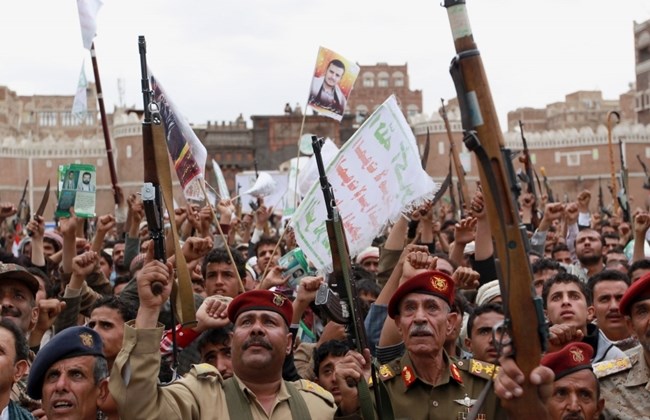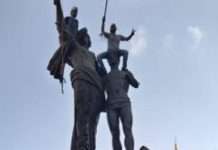Saudi-led campaign strikes Yemen’s Sanaa, Morocco joins alliance
Mohammed Mukhashef| Reuters/Daily Star/Mar. 27, 2015 |
ADEN: Yemen’s beleaguered government said Saudi-led airstrikes against its Houthi militia opponents would not last long on the second day of a Gulf Arab-led campaign against the Iranian-allied militia that could escalate a proxy conflict spreading through the region. Warplanes targeted Houthi forces controlling Yemen’s capital and their northern heartland on Friday and, in a boost for Riyadh, fellow monarchy Morocco said it would join the rapidly-assembled Sunni Muslim coalition against the Shi’ite Muslim group.
Tribes in Yemen’s oil producing Marib region said they supported the air campaign, but Houthi forces advanced south despite the airstrikes and Pakistan, named by Saudi Arabia on Thursday as a partner, said it had made no decision on whether to contribute. Riyadh’s move is the latest front in a growing regional contest for power with Iran that is also playing out in Syria, where Tehran backs Assad’s government against mainly Sunni rebels, and Iraq, where Iranian-backed Shi’ite militias are playing a major role in fighting.
Sunni monarchies in the Gulf are backing embattled Yemeni President Abed Rabbou Mansour Hadi and his fellow Sunnis in the country’s south against the Shi’ite advance. Yemeni Foreign Minister Riyadh Yaseen, asked if the campaign would last days, weeks or more, told Saudi-owned al-Arabiya television: “I expect that this operation will not go on for long, I think it will be days.”He said the door was still open for dialogue with the Houthis, while in a Facebook posting, Hadi urged Yemenis to be patient, saying the “rebels”, a reference to Houthis, would soon be gone. But Houthi fighters and forces allied to Saleh entered the southern provinces of Abyan and Shabwa on Friday through the central province of Bayda, extending their reach into the south, according to tribal sources.
The fighters entered the city of Lodar in Abyan after clashes with tribal forces loyal to Hadi, and also took over Bayhan in Shabwa, where they faced less resistance. Mosques in Riyadh on Friday preached fiery sermons against the Houthis and their Iranian allies, describing the fight as a religious duty. Saudi Arabia’s top clerical council issued a fatwa on Thursday giving its blessing to the campaign. In the Iranian capital Tehran, Friday prayer leader Ayatollah Kazem Sadeghi described the attacks as “an aggression and interference in Yemen’s internal affairs”. Residents said aircraft targeted bases around Sanaa of Republican Guards allied to the Houthis, including one near the presidential compound in a southern district, around dawn and also struck near a military installation that houses missiles.
OIL REGION HIT
The Republican Guards are loyal to former president Ali Abdullah Saleh, the Houthi’s main ally who retains wide power despite having stepped down in 2011 after Arab Spring protests. Earlier air strikes south of the city and in the oil-producing Marib region appeared to target military installations also affiliated with Saleh. Yemeni oil flows through the Marib pipeline, its main export route, at a rate of around 70,000 barrels per day (bpd). The well-armed tribes are the de facto authority in the central province so their support for the air strikes was significant. Warplanes also hit two districts in the Houthis’ northerly home province of Saada, tribal sources said. The strikes hit a market in Kataf al-Bokaa in the north of Saada, killing or wounding 15 people, they said. Shada district was also struck.
The coalition began air strikes on Thursday to try to roll back Houthi gains in the Arabian Peninsula country and to shore up the authority of embattled President Hadi, who has been holed up in Aden after fleeing Sanaa in February. Hadi left Aden on Thursday and is due to attend an Arab summit meeting in Egypt on Saturday, where he aims to build Arab support for the air strikes. He arrived in Saudi Arabia on Thursday by way of Oman, where a foreign ministry official said he had had a medical check up before heading on to the kingdom. The Saudi campaign raised morale among some Gulf Arabs who view Tehran’s growing influence in the region with suspicion.
One of the region’s top businessman, Khalaf Ahmad Al Habtoor of the United Arab Emirates, wrote on al Arabiya website in unusually frank terms that he was cheered by the Saudi move. “There can be no meaningful dialogue with the Islamic Republic of Iran, a nation with ambitions of reinstating the Persian Empire and quashing Arabs under its boot, just as it has stamped upon Sunnis and ethnic/religious minorities in Lebanon, Syria, Iraq,” he wrote. In his first reaction to the attacks, Houthi leader Abdel-Malek al-Houthi on Thursday called Saudi Arabia a bad neighbour and “Satan’s horn”, saying in a televised speech Yemenis would confront the “criminal, unjust and unjustified aggression”.
Iran denounced the surprise assault on the Houthis and demanded an immediate halt to Saudi-led military operations and, on Friday, accused Turkish President Tayyip Erdogan on Friday of fomenting strife in the Middle East, rebuffing his accusation that Iran was trying to dominate the region. While U.S. officials have downplayed the scope of the ties between Iran and the Houthis, Saudi ambassador to Washington Adel al-Jubeir said members of Iran’s Revolutionary Guards and Iranian-backed Hezbollah are on the ground advising the Houthis.
Saudi Brigadier General Ahmed Asseri, spokesman for the operation, told a news conference there were no plans at this stage for ground force operations, but if the need arose, Saudi and allied ground forces would repel “any aggression.” (With additional reporting by Mohammed Ghobari, Sami Aboudi, Maha El Dahan, Writing by William Maclean; editing by Philippa Fletcher)



















